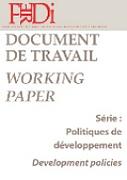Perception of COVID-19 and household behavior in Burkina Faso: Data analysis from a sample survey
June 30, 2022




Mathonnat J, Audibert M., Nossek V. (2021) Perception de la Covid et comportement des ménages au Burkina Faso. Une analyse sur données d’enquête, Ferdi Document de travail P286.